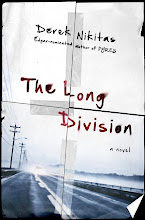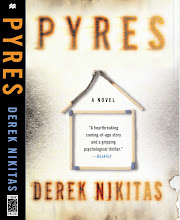So what do we really mean when we say we love lyrical novels for the language? We mean we love what the language evokes through denotation. Above all, we love vivid sensory detail because we can evoke in our mind's eye a moving picture of what the words represent. When we imaginatively move the stimulus away from language, away from arbitrary sound and printed letters on a page, when we move toward the thoroughly concrete sensory evocation--this is when we move toward a true experience worthy of the effort of reading fiction.
Take this bit from Jeffrey Eugenidies' The Virgin Suicides: "He came back to us with stories of bedrooms filled with crumpled panties, of stuffed animals hugged to death by the passion of the girls, of a crucifix draped with a brassiere, of gauzy chambers of canopied beds, and of the effluvia of so many young girls becoming women together in the same cramped space."
Certainly there are aural pleasure to be taken from this passage, pure sound delights: the suggestive verbs "filled," "stuffed," "hugged," "draped." The onomatopoetic cramped sound of "cramped." The breathless nature of the syntax--exactly how we'd expect the story teller to be telling the story of his illicit foray into the Lisbon girls' bedroom. The weird consonance between "crucifix" and "brassiere."
But all of these are secondary delights, something that registers with the reader on a fleeting, half-conscious level. Nobody except an analyst stops and notes consonance. And nobody sane takes delight in the mere presence of consonance, as if the repetition of consonant sounds moves him emotionally in some way. All these effects are of note because they relate to the context--to the story and what we're to draw from it. And that's not for the sake of "the language." That's for the sake of the story.
The primary pleasure of this passage is the sensory detail it provokes, the textures and the nostalgia regarding unfulfilled teenage hormonal fantasies. "...[T]he gauzy chamber of canopied beds" sounds good, but much more importantly it looks good in the mind's eye. We can see the numerous beds, all chambered off in different compartments by the canopies, but see-through, suffused with light from a window and gently floating, all evoking senses of intimacy and secrecy, yet ironically in a shared space. We enjoy what we see on a much deeper level than what we read.
And part of the reason we enjoy it so deeply is because we, the readers, are each participating in the creation of the sensory experience. The expert author has given us cues we'll use to develop the image, but ultimately the image belongs to us. It is an act of pure imagination so separated from language that it feels like liberation from some kind of tyranny, some semiotic anchor. If the words themselves give us any aural pleasure at all, it is usually an effect that serves to accompany the imagery we're developing in our minds.
We might hear the sounds that the various fabrics make when they're touched or when they flutter, and we might even hear them in the sounds of the words themselves ("effluvia," "gauzy chambers"). But sound has everything to do with enhancing the imagined sensory experience, and little to do with some kind of love for the words themselves, detached from context. (to be continued)



2 comments:
As an avid reader and writer, I agree with much of what you've written here, but without that "language," the reader is left with empty blanks they must fill in on their own. Great writers love language, they know how to shape and mold it so that readers who appreciate "lyrical" prose have something substantial in their hands and minds. The work is done; the reader is fully engaged in the world created by "language."
Avid reader, we agree! My real aim in this post is to help certain readers understand what is meant when someone says s/he "reads for the language." Because reading for the sounds of words alone is not what most people mean. I think the lyricism comes from evoked sensory experience--most of all, context, sensually-appropriate rhythm, diction, and the way the sounds of words evoke the sense of the passage (instead of merely sounding good in their own right). You compel me to go back and finish this essay!
Post a Comment